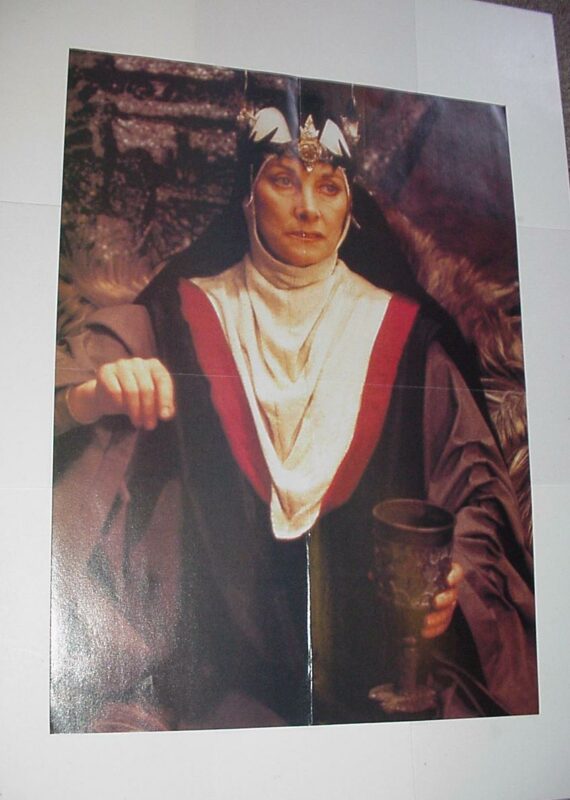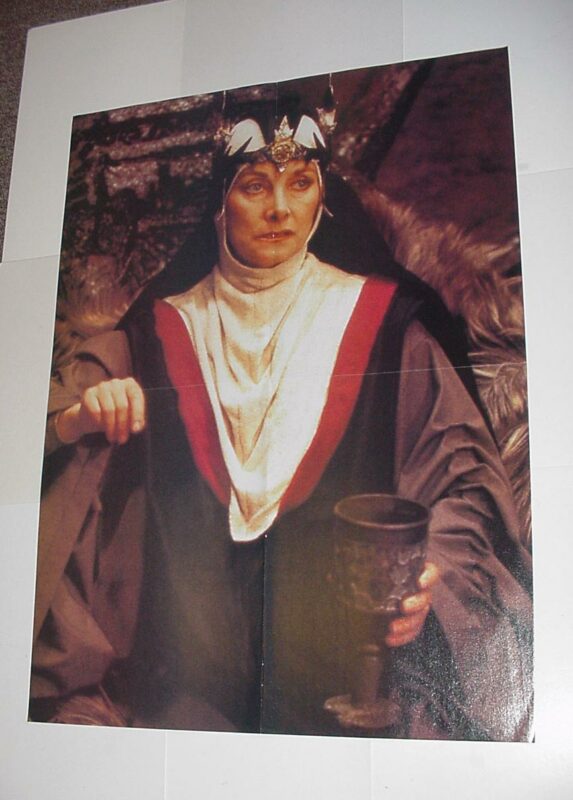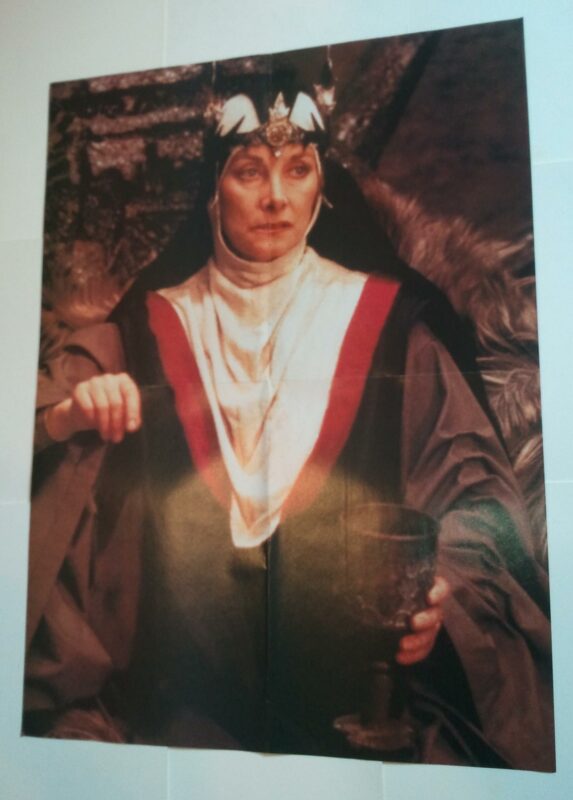Description
Willow is a 1988 American fantasy film directed by Ron Howard, produced and with a story by George Lucas, and starring Warwick Davis, Val Kilmer, Joanne Whalley, Jean Marsh, and Billy Barty. Davis plays the eponymous lead character and hero: a reluctant farmer who plays a critical role in protecting a special baby from a tyrannical queen in a sword and sorcery setting. Lucas conceived the idea for Willow in 1972, approaching Howard to direct during the post-production phase of Cocoon in 1985. Bob Dolman was brought in to write the screenplay, coming up with seven drafts before finishing in late 1986. Willow was then set up at Metro-Goldwyn-Mayer and principal photography began in April 1987, finishing the following October. The majority of filming took place at Elstree Studios in Hertfordshire, England, as well as Wales and New Zealand. Industrial Light & Magic created the visual effects sequences, which led to a revolutionary breakthrough with digital morphing technology. Willow was released in 1988 to mixed reviews from critics, but was a modest financial success and received two Academy Award nominations.
Fearful of a prophecy stating that a girl child will be born to bring about her downfall, the evil Queen Bavmorda (Jean Marsh) imprisons all the pregnant women of her realm in the formidable stronghold of Nockmaar. A child is born in the Nockmaar dungeons and identified as the prophesied child by a birthmark on her arm.
Before the black sorceress arrives to claim the child, the mother convinces her reluctant midwife to escape with the baby. Bavmorda sends her daughter Sorsha (Joanne Whalley) and General Kael (Pat Roach), the leader of her army, after the midwife to retrieve the baby. After a long pursuit, Nockmaar hounds finally catch up with the midwife. Knowing she can’t escape, she puts the baby on a makeshift raft and sends it downstream, trusting fate to run its course, just before she is caught and torn apart by the hounds. The child washes up on shore near a village inhabited by a race of hobbit-like people called Nelwyns and is found by the children of Willow Ufgood (Warwick Davis), a farmer and amateur conjurer with latent magical abilities. Willow is at first reluctant to take in the baby, but eventually comes to care for her.
George Lucas conceived the idea for Willow (originally titled Munchkins) in 1972. Lucas’ desire for Willow was similar to Star Wars, and created “a number of well-known mythological situations for a young audience”. During the production of Star Wars Episode VI: Return of the Jedi in 1982, Lucas approached Warwick Davis, who was portraying Wicket the Ewok, about playing Willow Ufgood. Five years passed before he was actually cast in the role. Lucas “thought it would be great to use a little person in a lead role. A lot of my movies are about a little guy against the system, and this was just a more literal interpretation of that idea.”
Lucas explained that he had to wait until the mid-1980s to make Willow because visual effects technology was finally advanced enough to execute his vision. Meanwhile, actor-turned-director Ron Howard was looking to do a fantasy film. Howard was at Industrial Light & Magic during the post-production phase of Cocoon, when he was first approached by Lucas to direct Willow. Howard had previously starred in Lucas’ American Graffiti, and Lucas felt that he and Howard shared a symbiotic relationship similar to the one Lucas enjoyed with Steven Spielberg.
Lucas based the character of General Kael (Pat Roach) on the film critic Pauline Kael, a fact that was not lost on Kael in her printed interview of the film. She referred to General Kael as an “homage a moi”. On a similar route, the two-headed dragon was named “Sispert” (“Eborsisk” in the novelization) after film critics Roger Ebert and Gene Siskel.
At the Academy Awards, the film was nominated for Sound Editing and Visual Effects, but lost both to Who Framed Roger Rabbit, which was similarly done by Industrial Light & Magic. The film won Best Costume Design at the Saturn Awards, where it was also nominated for Warwick Davis for Best Performance by a Younger Actor (lost to Fred Savage for Vice Versa) and Jean Marsh for Best Supporting Actress (lost to Sylvia Sidney for Beetlejuice). Willow also lost Best Fantasy Film and the Hugo Award for Best Dramatic Presentation to Roger Rabbit.
In April 2005, Lucas and Davis commented that a television series acting as a sequel was under consideration. In June 2008, Davis reiterated his hopes to return for a theatrically-released second installment of Willow. On February 15, 2013 Val Kilmer posted a photo via Twitter implying that Willow 2 was “Right around the corner!”. However, this coincided with a Life’s Too Short mockumentary featuring Davis and Kilmer, and is likely to have been a hoax. In March 2013, Davis indicated an interest in seeing a sequel (perhaps as a TV series), but gave no indication that any development was ongoing.
In a third series episode of An Idiot Abroad that co-starred Warwick Davis, a seemingly irritated Karl Pilkington states in an on-camera interview that people on the street recognized Davis and would reference his movies, saying “Somebody shouted ‘Willow!’ at him… I don’t know what he played in that!”
Jean Marsh as Queen Bavmorda: Villainous ruler of Nockmaar and mother of Sorsha.
Jean Lyndsey Torren Marsh, OBE (born 1 July 1934) is an English actress and writer. Marsh co-created and starred in the 1971 series Upstairs, Downstairs for which she received several awards including an Emmy Award for Outstanding Lead Actress in a Drama Series for her performance as Rose Buck in 1975. She later reprised her role of Rose for the BBC’s revival of the series in 2010. Marsh co-created the television series The House of Eliott in 1991.
Near mint condition.
Related products
-
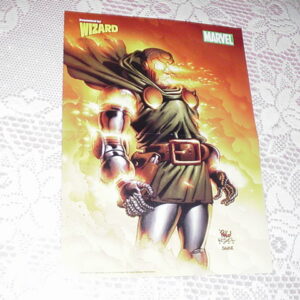
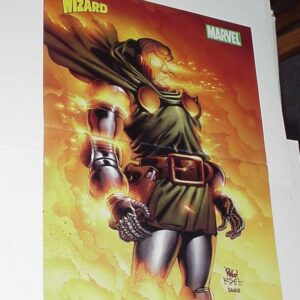
Doctor Doom Poster # 3 Triumphant by Mike Wieringo Fantastic Four 67
$34.99 Add to cart -
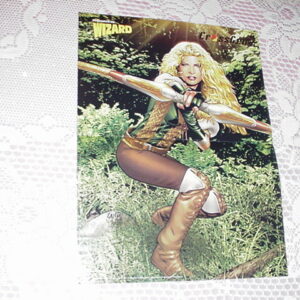
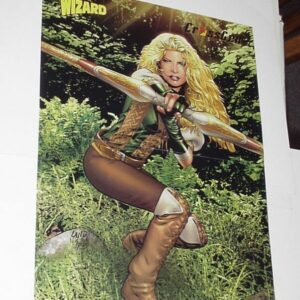
CrossGen Poster #18 Arwyn Greg Land Sojourn Bow of Ayden
$29.99 Add to cart -
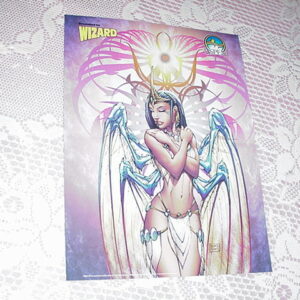

Soulfire Poster # 1 Grace by Michael Turner Fathom
$39.99 Add to cart -


X-Men Poster #35 Mystique Mike Mayhew Skull HOT # 9 Cover
$34.99 Add to cart
